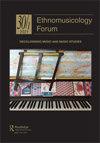A musico-choreographic analysis of a Cuban dance routine: a performance-informed approach
IF 0.5
1区 艺术学
0 MUSIC
引用次数: 0
Abstract
ABSTRACT McKerrell, in ‘Towards Practice Research in Ethnomusicology’, advocates for performance to be used as ‘a central methodology’, as a ‘translation of artistic performance aesthetics’ and as a ‘research outcome sited in original performance’ (2019). The translational role for performance is demonstrated in this article through a practice-led investigation into the dynamic relationship between improvised music and dance. The research is based on the analysis of a live performance on Cuban television of ‘Los Problemas de Atilana’ by Orquesta Aragón in the early 1960s, where musical gestures are shown to be embodied in the flute and dance solo ‘duet’ performed by Cuban flautist Richard Egües and dancer Rafael Bacallao, revealing the shared memories of a community bound by common cultural experience. Interdisciplinary in nature, analysis is undertaken by a musician-scholar, a film scholar-practitioner and a professional Cuban dancer-animator in order to unearth details of this embodied repertoire, thus translating and making overt culturally implicit knowledge for those outside of the artistic community of practice, and, in some cases, within it. Through re-performance and re-presentation in the form of a recording and animations, the many meanings embodied in the original performance are examined through analytical text, musical notation, visuals, recordings and animation film.古巴舞蹈套路的音乐编舞分析:一种表演知情的方法
摘要McKerrell在《走向民族音乐学的实践研究》一书中主张将表演作为“一种中心方法论”、“艺术表演美学的翻译”和“基于原始表演的研究成果”(2019)。本文通过对即兴音乐和舞蹈之间动态关系的实践引导调查,展示了表演的翻译作用。这项研究是基于对20世纪60年代初Orquesta Aragón在古巴电视台的“Los Problemas de Atilana”现场表演的分析,在这场表演中,音乐手势体现在古巴长笛演奏家Richard Egües和舞蹈家Rafael Bacallao表演的长笛和舞蹈独奏“二重奏”中,揭示了一个受共同文化体验约束的社区的共同记忆。从本质上讲,分析是跨学科的,由一位音乐家学者、一位电影学者从业者和一位专业的古巴舞蹈家动画师进行,以挖掘这一具体剧目的细节,从而为艺术实践界之外的人,在某些情况下,为艺术实践圈内部的人翻译和创造公开的文化隐性知识。通过录音和动画形式的重新表演和重新呈现,通过分析文本、乐谱、视觉、录音和动画电影来检验原始表演中所体现的许多含义。
本文章由计算机程序翻译,如有差异,请以英文原文为准。
求助全文
约1分钟内获得全文
求助全文
来源期刊

Ethnomusicology Forum
MUSIC-
CiteScore
1.10
自引率
25.00%
发文量
29
期刊介绍:
Articles often emphasise first-hand, sustained engagement with people as music makers, taking the form of ethnographic writing following one or more periods of fieldwork. Typically, ethnographies aim for a broad assessment of the processes and contexts through and within which music is imagined, discussed and made. Ethnography may be synthesised with a variety of analytical, historical and other methodologies, often entering into dialogue with other disciplinary areas such as music psychology, music education, historical musicology, performance studies, critical theory, dance, folklore and linguistics. The field is therefore characterised by its breadth in theory and method, its interdisciplinary nature and its global perspective.
 求助内容:
求助内容: 应助结果提醒方式:
应助结果提醒方式:


